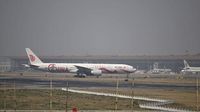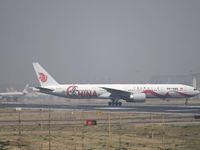China has reportedly ordered its airlines to cease taking delivery of Boeing jets in response to a significant escalation in the trade war with the United States. Following U.S. President Donald Trump’s imposition of a staggering 145 percent tariff on Chinese goods, the Chinese government has enacted this directive, which also includes halting the import of parts and supplies from American aviation companies.
Bloomberg News first reported this development on April 15, 2025, citing unnamed sources familiar with the situation. The directive is expected to have far-reaching implications for both Boeing and the global aerospace industry, which is already grappling with the complexities of international trade.
China's top three airlines—Air China, China Eastern Airlines, and China Southern Airlines—had previously planned to take delivery of 45, 53, and 81 Boeing planes respectively between 2025 and 2027. With the new order from Beijing, these deliveries are now in jeopardy.
Additionally, the Chinese government has requested that its carriers halt purchases of aircraft-related equipment and parts from U.S. manufacturers, a move that is likely to increase maintenance costs for existing Boeing jets operating in the country.
China's decision to halt deliveries comes on the heels of its own tariff increase on U.S. goods, which has now reached 125 percent. This retaliatory measure follows Trump's tariffs, which were aimed at balancing trade disparities between the two nations. The situation has created a complex web of economic interdependence and tension, particularly affecting the aviation sector.
Trump confirmed the reports in a post on Truth Social, stating, "Interestingly, they just reneged on the big Boeing deal, saying that they will 'not take possession' of fully committed to aircraft." This statement underscores the growing frustrations between the two countries, with trade tensions flaring as both sides seek to assert their economic interests.
Boeing has already faced significant challenges in recent years, including a series of high-profile accidents and regulatory scrutiny. The company grounded its 737 MAX jets following two fatal crashes in 2018 and 2019 that resulted in nearly 350 deaths. The halt in deliveries to China marks yet another setback for Boeing, which is struggling to recover from a tumultuous period marked by labor strikes and persistent supply chain disruptions.
In the first quarter of 2025, Boeing shipped 130 aircraft, most of them 737s, but it remains unclear how many of these were destined for China. Reports indicate that Boeing was preparing to send about ten 737s to China when the order from Beijing was issued.
The impact of this ban is already being felt in the stock market. Shares for Airbus, Boeing's primary competitor, rose by almost a full percentage point, while Boeing shares fell by more than 2.4 percent on the news of the halted deliveries. Analysts suggest that this situation may open doors for Airbus and the Commercial Aircraft Corporation of China (COMAC), a domestic manufacturer, to capture a larger share of the market.
Despite the immediate challenges, some analysts believe that Boeing may be able to reallocate the aircraft to other airlines that are in need of additional capacity. Ronald J. Epstein, an analyst at Bank of America, stated, "Boeing should have no difficulty reallocating the aircraft to other airlines that need additional capacity. We see India as a potential recipient." This perspective offers a glimmer of hope for Boeing amidst the turmoil.
However, the long-term implications of China’s ban on Boeing deliveries are still uncertain. While the Chinese government may not sustain this stoppage for an extended period due to its limited capacity to manufacture its own jets, the situation could still provide a structural advantage for Airbus in the Chinese market.
On the diplomatic front, Chinese leader Xi Jinping has emphasized the importance of maintaining a stable global trading system. He stated, "Nations need to safeguard the multilateral trading system, stable global industrial and supply chains, and an open and cooperative international environment." This call for cooperation contrasts sharply with the escalating trade tensions and highlights the complexities of international relations in the current economic climate.
As the situation develops, both Boeing and its competitors will be closely monitoring the unfolding trade dynamics. The aviation industry is at a crossroads, and decisions made in the coming weeks and months will shape the landscape for years to come.
In summary, the cessation of Boeing jet deliveries by Chinese airlines marks a pivotal moment in the ongoing trade war between the U.S. and China. With significant implications for both nations' economies and the global aerospace industry, this development underscores the fragility of international trade relations in an increasingly polarized environment.






